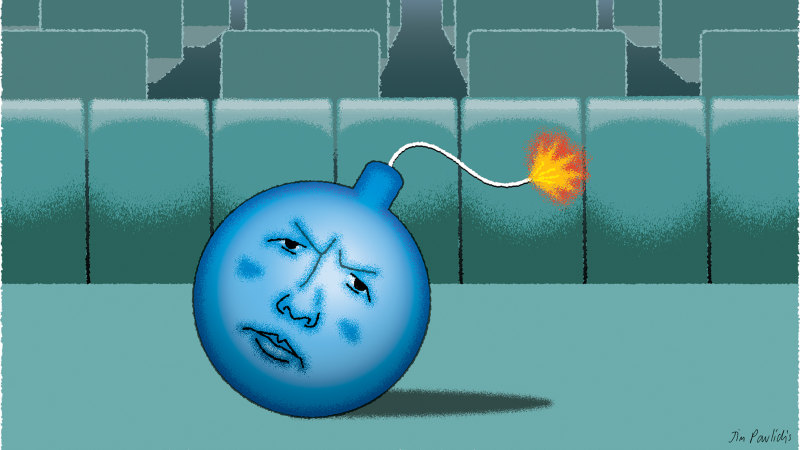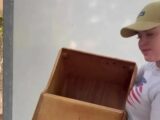
The dream of strong political leadership
November 16, 2023Save articles for later
Add articles to your saved list and come back to them any time.
Jim PavlidisCredit: .
To submit a letter to The Age, email [email protected]. Please include your home address and telephone number. No attachments, please include your letter in the body of the email. See here for our rules and tips on getting your letter published.
I had a dream that we had a political leader who had this dream: “We declare our nation neutral. We are no longer wasting billions of dollars on war. We are choosing a sustainable future. In a spirit of connectedness, we are committed to surviving the present and future desperate challenges of climate change. Australia will be an extremely resourceful think tank and welcome all ideas. From our endeavours will come new innovations that restore hope and health to all living things.”
Then I woke up. Cherryl Barassi, St Kilda
Dutton’s different frames of mind
Peter Dutton is so intent on political point-scoring that he cannot decide whether he wants a united Australia, as he claimed during the referendum on an Indigenous Voice to parliament, or a divided Australia by trying to increase the anger of one section of our Australian community against another section of our community as he did in parliament yesterday. We deserve better.
Susan Kelly, Highton
The politics of division must not prevail
Shaun Carney (Comment, 16/11) uses the current domestic angst generated by the troubles in the Middle East to highlight electoral implications for political parties. Potentially divisive issues of any sort are both a threat and an opportunity for politicians. Some politicians seek to use division to their advantage by inflaming the division while cynically feigning concern. Other politicians seek to heal division through applying nuance and empathy to the debate.
Australia is a diverse multicultural society; we are also diverse in geography, education, wealth, gender, religion, sexuality and values. These many points of difference can be used by unscrupulous politicians to fracture the public’s confidence, the familiar divide and conquer strategy. We have seen the power of division and fear in operation recently through the referendum, and we are seeing it again as another tragedy unfolds in the Middle East. The politics of division will keep happening as long as it keeps paying a political dividend to the dividers.
Graeme Henchel, Yarra Glen
Albanese, control your ministers
Columnist David Crowe presents Peter Dutton’s performance in parliament yesterday as a blunder, and reckless at that (″An ugly fight we do not need″, 16/11). Allegedly he misused the issue of extremism in the community. However, because a high-profile minister – Tony Burke – gave an interview on October 27, linking (within a handful of sentences) recent civilian deaths in Gaza to 17 years of Israeli policy, the government is open to reproach. Burke may have facts on his side, but the time to criticise that policy was every day up to October 6 through Foreign Minister Penny Wong, not afterwards through the minister for employment. Albanese needs to control his ministers better. It is not Dutton’s job to spare the government from scrutiny or embarrassment.
Alun Breward, Malvern East
Empathy demands both hands reach out
Peter Dutton demands national cabinet discuss “concerns raised by Australia’s Jewish community about their safety”. What about concerns raised by Australia’s Muslim community about their safety? Dutton wants “a statement [where all] confirm their support for Australia’s Jewish community, condemn antisemitism in all forms, and declare any attack on Australians for their religious beliefs unacceptable”. What about confirming support for our Muslim community and condemning Islamophobia? I’m Jewish and I am disgusted by Dutton’s omission of Muslims from his statements. Dutton chose sides, emphatically creating, fostering, encouraging division. Albanese chose leadership: “I make no apologies for trying to bring communities together, not divide them, because that’s the role of political leaders.” It’s impossible to be Jewish and ignore the plight of our Muslim sisters and brothers. I mourn with all.
Judy Bamberger, O’Connor, ACT
FORUM
Slow track to airport
It’s good to know the third most-liveable city in the world will have a direct rail link to its main airport by the end of this decade. That’s only four decades later than Sydney, and better than half a century or more after Singapore, Paris, Vienna, and countless other “less-liveable” cities.
Ron Burnstein, Heidelberg
Political loss
As a Jew, I am appalled by Peter Dutton’s weaponisation of antisemitism in parliament at this terrible time for his own political gain. Not in my name.
Fiona Maguire, Coburg
Law not flouted
Greg Rose (Comment, 16/11) has potently given the lie to accusations that Israel has flouted international humanitarian law in how it has conducted its war against Hamas in Gaza (“Hamas has changed the state of war”, 16/11). As Rose states, under the Geneva Conventions, Gaza’s hospitals become legitimate targets when they are used to shelter military assets.
Moreover, Rose reveals that the ratio of civilian casualties to combatant deaths is markedly lower than that which occurred in other global wars from 1990-2000.
Despite this, the terms, “genocide” and “disproportionate response” have been used almost exclusively to describe Israel’s response to Hamas’ October 7 atrocities; particularly grotesque accusations, given that the retaliation by the US and its allies to the 9/11 terrorist attacks has resulted in 4.5 million deaths.
Geoff Feren, St Kilda East
Futility at work
Nothing could be more futile than Australian politicians calling for a ceasefire in Gaza.
Reg Murray, Glen Iris
Getting message across
The fake dead bodies protest is confronting but gets the message across. Years ago a group of us from Amnesty International wore white plastic safety suits covered in red paint in a May Day march to draw attention to the torture of political prisoners in other countries.
Mary Fenelon, Doncaster East
A hermit state?
Peter Dutton wants Anthony Albanese to skip the APEC meeting. If he ever becomes PM, Australia will become a hermit state out of sight of the rest of the world.
John Walsh, Watsonia
Switched-on youth
Your correspondent’s view that state schools are not fostering or supporting an education for ecological sustainability and associated socio-cultural issues is unfounded (″Intelligent youth are keen to be heard″, 16/11).
Even a cursory glance at the Victorian and NSW K-12 curriculums would allay such concerns. Having worked in public schools for more than 30 years, rest assured, our students who hail from a range of backgrounds, are well informed.
It is also fair to say that many of them are only too well aware of the ″socio-economic issues″, having actual lived experiences, perhaps unlike some of their peers in private schools.
Most of them are ″intelligent, articulate and enthusiastic″. Some have chosen to attend climate rallies, some haven’t.
Craig Jory,
Albury, NSW
Crisis in pathology
It is commendable that attention has been brought to the crisis in the pathology workforce (″Medical test delays could be endangering patients″, 13/11).
On a background of inadequate funding for training positions, hospital pathology departments and outdated Medicare rebates, the demand for histopathology has increased while there are scarce anatomical pathologists.
Rather than being supported in this crisis, anatomical pathologists are chastised for “delayed turnaround times”. Increased error rates due to unsustainable workloads and unrealistic time pressure are real dangers and experienced pathologists are changing workplaces, reducing hours, or leaving the field.
Histopathology is increasingly complex and reports are written by passionate, medically trained professionals. Histopathology turnaround times of the past are not viable in the current environment.
Adequate funding is imperative and referring specialists could be supportive and adjust their expectations and follow-up times accordingly.
The “medical test” process is not confined to the time taken between a specimen arriving in the laboratory and reports being issued.
The time taken for a patient to identify a problem and navigate through GP and other specialists and diagnostic sampling processes is considerable. Many other specialists have waiting lists for some weeks. While striving to get reports out quickly, pathologists must not accept the role of the scapegoat and the importance of our skill set must not be reduced to sudden urgency at the end of the diagnostic process.
Anatomical pathologist,
name and address supplied
Too small to see
The speed display in my small car, and on most others, tops out at around 240 km/h, with 120 in the middle of the scale. That’s absurd for most cars and most circumstances.
On that scale, 30 km/h is so close to 20 and 40 that it can hardly be read accurately, and trying is a distraction. If we keep moving, as we should, to such low speed limits with a realistic expectation that they be observed, we need more meaningful speed scales, expanded at low speeds for easy reading at a glance. Maybe a logarithmic scale.
Ralph Böhmer, St Kilda West
Peter, Paul and tarry
After reading the report in relation to Melbourne Airport’s rail link (16/11) it seems the plan the government has for upgrades is to rob Peter to pay Paul.
Anthony Albanese’s plan to bring forward the long-awaited airport rail project is being held up by Premier Jacinta Allan’s protests to delay yet again the project.
Isn’t this a case of, increase the population until all transport means can no longer cope, then think about how to fix it with strong complaints coming from all directions on the subject of cost.
It would seem upgrading infrastructure before increasing the population would avoid the frustration felt by motorists, pedestrians, and public transport overload.
Sharon Hendon, Glen Iris
Biodiversity loss
What on Earth are we doing, heading towards a massive population in a country that is the driest inhabited continent in the world, with only 4 per cent arable land and 70 per cent arid or semi-arid? The soils of arid Australia have been weathered and leached more than any others making them the most nutrient-deficient soils in the world.
Both the State of the Environment report (2021), and the IPCC (International Panel on Climate Change) report state quite clearly that population growth and economic growth are the key drivers of biodiversity loss and climate change.
Unless we open our eyes to see what is actually going on, we are heading blindly into an unforgiving future.
Jennie Epstein, Little River
Fight for the future
Your correspondent (Letters, 16/11) is disingenuous claiming that the participants of the school strike for climate may be marching because they have been manipulated, incited and used for propaganda. On the contrary, in previous school climate events the “strikers were intelligent, articulate, enthusiastic and keen to have their voices heard”.
No, they are fighting for their future that we seem so keen on denying them.
Jerry Koliha, South Melbourne
One law for all
Some politicians love to stir up fear and anger by saying that no punishment is enough for crimes, that no criminal should finish their sentence or get parole. So-called ″law and order″ campaigns are about vengeance, which has no natural limits, not about law. There must be thousands of people who have served their sentences now living in the community, as they should be. Refugees and stateless people have the same human rights to court-limited punishment as citizens.
Jocelyn Penington, Brunswick
Warning on wages
Workers, particularly low-income earners, should be celebrating the fact that wage growth is at a 14-year high but instead are being warned that it is as good as it gets (16/11). One thing is certain, it is much better than how workers fared under the previous decade of Coalition government.
Phil Alexander, Eltham
A girl’s message
Your correspondent’s warning of the damage Israel’s actions in Gaza will cause to Jewish people around the world (Letters, 15/11) isn’t that different to what Anne Frank, the young Jewish girl murdered at Auschwitz wrote: ″What one non-Jew does is their own responsibility, whereas what a Jew does is thrown back at all Jews.″ That is, some things just never change.
Henry Herzog, St Kilda East
Marching to peace
A peaceful march (Letters, 16/11) what an excellent idea. Participants could hold candles for added emphasis. Are we mature enough for it to happen?
Jane Ross, San Remo
It’s good ooze week
After endless news reports about our world being taken over by wars, politics and AI, how refreshing to read about those delightful slime moulds (“In a forest, one woman built a house of slime”, 14/11). Restored my faith in the world.
Chris Wilson, Poowong
AND ANOTHER THING
Climate
A young person protesting climate change who produced a sick leave note citing mental health anxiety about one’s future would be quite acceptable.
Denis Liubinas, Blairgowrie
The young know they’ve been let down by government inaction on climate. They have every right to protest. It’s their future.
Belinda Burke, Hawthorn
Speed limits
Bring back the Flintstones walking car. That way Yarra Council could also advance its other key policy of taking action to save the climate.
Denny Meadows, Hawthorn
A speed limit of 30km/h in Yarra? Is the council trying to speed up the traffic?
Shaun Lawrence, Richmond
As a pedestrian living in the City of Yarra I hope bikes will be restricted to 30km/h as well as cars.
Sue Bradshaw, Fitzroy
Will cyclists be booked for exceeding the new speed limit?
Richard Marsh, Fitzroy
Furthermore
Why spend billions on an airport rail link? Extra buses direct from Broadmeadows station would be a cost-neutral solution.
Arthur Pritchard, Ascot Vale
The airport rail link has been a Melbourne joke for more than 50 years.
John Manfield, Blairgowrie
To have good government we need good opposition. The time has come to push the button on Dutton.
Bruce Dudon, Woodend
Perhaps Anthony Albanese has just had the same response from China as Neville Chamberlain received in his “peace in our time” moment in 1938.
Peter Caffin, North Ringwood
Finally
Re AUKUS, how are nuclear submarines going to protect Australia from cyberattacks?
Julie Ottobre, Brunswick East
Most Viewed in National
From our partners
Source: Read Full Article


